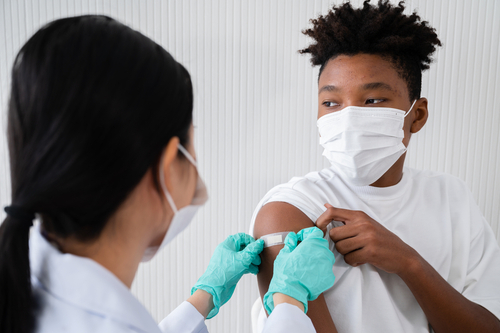
Yes! Flu shots save lives! For healthy people, the flu may be a nuisance, so the shot can reduce your risk of getting ill and losing time from work or school. If you have health issues, the shot can actually reduce your risk for more serious complications such as pneumonia, hospitalization, and death. In addition, by reducing your risk you can help prevent the spread of flu to other vulnerable people who may be at risk for complications, such as babies and the elderly.
Will This Flu Season Be Worse Than Last Year?
With COVID-19 cases on the rise, medical experts are concerned that hospitals will be overwhelmed by both flu and coronavirus cases. Last year saw a record-low number of flu cases, likely due to widespread mask wearing, remote work and school, and physical distancing. But this year, experts fear that the reopening of schools, decreased adherence to pandemic precautions, and surging Delta variant infections could create a very serious flu and COVID-19-season.
When Should You Get the Flu Vaccine?
In short, it's best to get your flu shot before flu season begins and definitely before it peaks in the winter months.
Flu season occurs during the fall and winter, peaking between December and February. However, experts recommend that people get their flu shot between September and October since the virus can start circulating in late fall.
Why Should You Get Your Flu Shot Earlier?
It's a good idea to get your flu shot as early as possible, but not too early. For example, if you were to receive a flu vaccine in June, you're potentially opening yourself up to weaker protection from the flu vaccine once winter comes. You should aim to get your flu shot in the early fall months, before community spread begins. But if you miss this window, you will benefit from getting the flu shot anytime in the winter through March.
In early January of 2020, New Jersey was experiencing widespread illnesses due to the flu. This is a good metric in which to measure when flu season peaks.
Should You Get the Flu Shot?
Yes. Everyone 6 months and older should get the flu vaccine, especially those who are at high risk of developing complications from the flu. Exceptions include those who have severe allergies to the flu vaccine or its ingredients. If you are not feeling well, have an allergy, or ever had Guillain-Barre syndrome, you should talk to your doctor about getting the flu shot. Not only does the flu vaccine help prevent widespread illness and limits community spread, but it also protects our most vulnerable populations, including the elderly and immunocompromised.
What Are Flu Shot Side Effects?
Although extremely rare, side effects can develop after vaccination. Some of the most common flu shot side effects are soreness in the arm, headache, fever, and mild nausea.
Can You Get Both the Flu Shot and COVID-19 Vaccine?
Yes. The Centers for Disease Control and Prevention (CDC) says it's safe to get both vaccines at once. If you do get two shots on the same day, expect to get each vaccine in a different arm, which may reduce any pain and swelling that might occur.
Right now, third doses of COVID-19 vaccine are authorized only for people with certain immunocompromised conditions. The CDC and Food and Drug Administration (FDA) are still analyzing the booster roll out and should have a recommendation by September 20th on when fully vaccinated people can get the additional dose. Once the boosters are more broadly authorized, you can get the COVID-19 booster and the flu shot administered at the same time.
Vaccinations work
The evidence is clear. Vaccines work to prevent disease spread, severe illness, and hospitalization.
